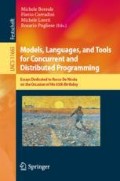Abstract
The concept of autonomy is key to the IoT vision promising increasing integration of smart services and systems minimizing human intervention. This vision challenges our capability to build complex open trustworthy autonomous systems. We lack a rigorous common semantic framework for autonomous systems. It is remarkable that the debate about autonomous vehicles focuses almost exclusively on AI and learning techniques while it ignores many other equally important autonomous system design issues.
Autonomous systems involve agents and objects coordinated in some common environment so that their collective behavior meets a set of global goals. We propose a general computational model combining a system architecture model and an agent model. The architecture model allows expression of dynamic reconfigurable multi-mode coordination between components. The agent model consists of five interacting modules implementing each one a characteristic function: Perception, Reflection, Goal management, Planning and Self-adaptation. It determines a concept of autonomic complexity accounting for the specific difficulty to build autonomous systems.
We emphasize that the main characteristic of autonomous systems is their ability to handle knowledge and adaptively respond to environment changes. We advocate that autonomy should be associated with functionality and not with specific techniques. Machine learning is essential for autonomy although it can meet only a small portion of the needs implied by autonomous system design.
We conclude that autonomy is a kind of broad intelligence. Building trustworthy and optimal autonomous systems goes far beyond the AI challenge.
Access this chapter
Tax calculation will be finalised at checkout
Purchases are for personal use only
References
Maler, O., Pnueli, A., Sifakis, J.: On the synthesis of discrete controllers for timed systems. In: Mayr, E.W., Puech, C. (eds.) STACS 1995. LNCS, vol. 900, pp. 229–242. Springer, Heidelberg (1995). https://doi.org/10.1007/3-540-59042-0_76
Sifakis, J.: System design in the era of IoT—meeting the autonomy challenge, invited paper. In: MetRiD 2018, EPTCS, vol. 272, pp. 1–22 (2018). https://doi.org/10.4204/eptcs.272.1
De Nicola, R., Maggi, A., Sifakis, J.: DReAM: dynamic reconfigurable architecture modeling. In: Margaria, T., Steffen, B. (eds.) ISoLA 2018. LNCS, vol. 11246, pp. 13–31. Springer, Cham (2018). https://doi.org/10.1007/978-3-030-03424-5_2
El Ballouli, R., Bensalem, S., Bozga, M., Sifakis, J.: Four exercises in programming dynamic reconfigurable systems: methodology and solution in DR-BIP. In: Margaria, T., Steffen, B. (eds.) ISoLA 2018. LNCS, vol. 11246, pp. 304–320. Springer, Cham (2018). https://doi.org/10.1007/978-3-030-03424-5_20
El Ballouli, R., Bensalem, S., Bozga, M., Sifakis, J.: Programming dynamic reconfigurable systems. In: FACS 2018, pp. 118–136 (2018)
Sifakis, J.: Rigorous system design. Found. Trends Electron. Des. Autom. 6(4), 293–362 (2012)
Lewis, P.R., et al.: Architectural aspects of self-aware and self-expressive computing systems: from psychology to engineering. IEEE Comput. 48(8), 62–70 (2015)
Bensalem, S., Bozga, M., Quilbeuf, J., Sifakis, J.: Optimized distributed implementation of multiparty interactions with restriction. Sci. Comput. Program. 98(2), 293–316 (2015)
Maggio, M., et al.: Self-adaptation for individual self-aware computing systems. In: Kounev, S., Kephart, J., Milenkoski, A., Zhu, X. (eds.) Self-Aware Computing Systems, pp. 375–399. Springer, Cham (2017). https://doi.org/10.1007/978-3-319-47474-8_12
Efroni, S., Harel, D., Cohen, I.R.: Reactive animation: realistic modeling of complex dynamic systems. Computer 38, 38–47 (2005)
Combaz, J., Fernandez, J.-C., Sifakis, J., Strus, L.: Symbolic quality control for multimedia applications. Real-Time J. 40(1), 1–43 (2008)
Basu, A., et al.: Rigorous component-based system design using the BIP framework. IEEE Softw. 28(3), 41–48 (2011)
Nouyan, S., Gross, R., Bonani, M., Mondada, F., Dorigo, M.: Teamwork in self-organized robot colonies. IEEE Trans. Evol. Comput. 13(4), 695–711 (2009)
Zolghadri, A.: Advanced model-based FDIR techniques for aerospace systems: today challenges and opportunities. Progr. Aerosp. Sci. 53, 18–29 (2012)
Shalev-Shwartz, S., Shammah, S., Shashua, A.: On a formal model of safe and scalable self-driving cars. Mobileye (2017). arXiv:1708.06374v5 [cs.RO]
Wikipedia. https://en.wikipedia.org/wiki/Autonomic_computing
Kephart, J., Walsh, W.: An artificial intelligence perspective on autonomic computing policies. In: Proceedings of the Fifth IEEE International Workshop on Policies for Distributed Systems and Networks (POLICY 2004) (2004)
An architectural blueprint for autonomic computing. White paper, 3rd edn. IBM, June 2005
Author information
Authors and Affiliations
Corresponding author
Editor information
Editors and Affiliations
Rights and permissions
Copyright information
© 2019 Springer Nature Switzerland AG
About this chapter
Cite this chapter
Sifakis, J. (2019). Autonomous Systems – An Architectural Characterization. In: Boreale, M., Corradini, F., Loreti, M., Pugliese, R. (eds) Models, Languages, and Tools for Concurrent and Distributed Programming. Lecture Notes in Computer Science(), vol 11665. Springer, Cham. https://doi.org/10.1007/978-3-030-21485-2_21
Download citation
DOI: https://doi.org/10.1007/978-3-030-21485-2_21
Published:
Publisher Name: Springer, Cham
Print ISBN: 978-3-030-21484-5
Online ISBN: 978-3-030-21485-2
eBook Packages: Computer ScienceComputer Science (R0)

